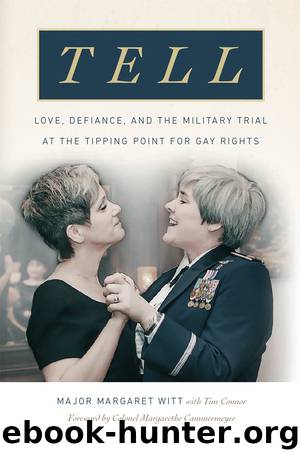Tell by Major Margaret Witt

Author:Major Margaret Witt
Language: eng
Format: epub
Publisher: University Press of New England
Chapter 14
THE WILDERNESS
If Grethe’s advice to Margie had a certain edge and ring to it, it was because she had, in her own time, met the Army and the U.S. government at the brink.
By telling the truth about her sexual orientation during her security interview in 1989, she had triggered a landslide of bricks from above.
“I did not realize,” she wrote in her memoir, “that by saying to Agent Troutman, ‘I am a lesbian,’ I would lose my career in a country that espoused equality for all. And I didn’t know that by being forced to speak out, first privately, then publicly, I would find the most important mission of my life.”
She had gone public in August 1991, giving a long telephone interview to Randy Shilts for an article in the San Francisco Chronicle. Given her rank, her list of achievements, and her award for valor in Vietnam, the story traveled well. She became a cause célèbre, especially in the Pacific Northwest, and it wasn’t long before she came to the attention of a rising political star, Arkansas governor Bill Clinton. As Clinton was running for president in 1992, he used Grethe’s life story to build public support for his pledge to end the military’s ban on gay service members. The pledge helped him capture a growing wave of Democratic Party activists, especially on the West Coast. At age forty-six, he became the third-youngest president in U.S. history.
Then came the cloud of locusts. Clinton’s vow to end the policy triggered an extraordinary cultural and political backlash, fueled by well-organized fundamentalist Christian organizations like the Family Research Council and the Traditional Values Coalition. Even worse, the Pentagon was in revolt. The Joint Chiefs of Staff, led by its chairman, General Colin Powell, were so vehemently opposed to lifting the ban that, according to Newsweek, they threatened to resign en masse.
Congressional supporters of the military’s ban on homosexuals also took steps to block any move by the new president. One of Clinton’s fiercest opponents on the issue was another leading Democrat, Senator Sam Nunn of Georgia, who chaired the powerful Senate Armed Services Committee. In March 1993, Senator Nunn and his committee opened a round of hearings. Grethe was the lone, lesbian service member invited to testify, and by then the die was cast. There would be no end to the ban on gay service members. Instead, the government would repackage the policy. The military would no longer ask recruits about their sexual orientation. Service members would henceforth be expelled only “when their homosexuality is manifested by objective criteria—homosexual acts, homosexual statements, or homosexual marriage.”
The “Don’t Ask, Don’t Tell” shorthand for the modified policy was coined by a sociologist, Charles Moskos, who was closely connected to Senator Nunn. In practice, though, “Don’t Ask, Don’t Tell” was highly misleading, as there would be countless cases—Margie’s among them—where the military didn’t ask, the service member didn’t tell, and the expulsion happened anyway.
A humbled Bill Clinton announced his support for the new policy in July 1993, defending it as “an honorable compromise.
Download
This site does not store any files on its server. We only index and link to content provided by other sites. Please contact the content providers to delete copyright contents if any and email us, we'll remove relevant links or contents immediately.
| African-American Studies | Asian American Studies |
| Disabled | Ethnic Studies |
| Hispanic American Studies | LGBT |
| Minority Studies | Native American Studies |
Cecilia; Or, Memoirs of an Heiress — Volume 1 by Fanny Burney(31324)
Cecilia; Or, Memoirs of an Heiress — Volume 3 by Fanny Burney(30928)
Cecilia; Or, Memoirs of an Heiress — Volume 2 by Fanny Burney(30885)
The Great Music City by Andrea Baker(21195)
We're Going to Need More Wine by Gabrielle Union(18065)
Bombshells: Glamour Girls of a Lifetime by Sullivan Steve(13101)
Pimp by Iceberg Slim(12923)
All the Missing Girls by Megan Miranda(12739)
Fifty Shades Freed by E L James(12443)
Norse Mythology by Gaiman Neil(11874)
Talking to Strangers by Malcolm Gladwell(11861)
Crazy Rich Asians by Kevin Kwan(8341)
Mindhunter: Inside the FBI's Elite Serial Crime Unit by John E. Douglas & Mark Olshaker(7827)
The Lost Art of Listening by Michael P. Nichols(6462)
Enlightenment Now: The Case for Reason, Science, Humanism, and Progress by Steven Pinker(6403)
Bad Blood by John Carreyrou(5761)
The Four Agreements by Don Miguel Ruiz(5502)
Weapons of Math Destruction by Cathy O'Neil(5029)
We Need to Talk by Celeste Headlee(4861)
